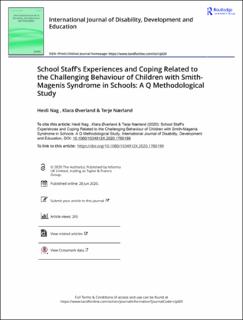| dc.contributor.author | Nærland, Terje | |
| dc.contributor.author | Øverland, Klara | |
| dc.date.accessioned | 2023-01-16T12:40:11Z | |
| dc.date.available | 2023-01-16T12:40:11Z | |
| dc.date.created | 2020-08-13T09:20:44Z | |
| dc.date.issued | 2020 | |
| dc.identifier.citation | Nag, H., Øverland, K., & Nærland, T. (2020). School staff’s experiences and coping related to the challenging behaviour of children with Smith-Magenis syndrome in schools: AQ methodological study. International Journal of Disability, Development and Education, 1-16. | en_US |
| dc.identifier.issn | 1034-912X | |
| dc.identifier.uri | https://hdl.handle.net/11250/3043731 | |
| dc.description.abstract | The aim of this study is to use Q methodology to explore how school staff experience the behaviours of children with Smith-Magenis Syndrome (SMS) in school and how they manage working with these children. Q methodology utilises by-person factor analysis to investigate subjectivity. Fourteen school staff of students with SMS in Norway participated and sorted 40 statements according to their own experience working with a student with SMS. Two distinct viewpoints were revealed, namely, 1) Managing challenging aggressive and self-injury behaviours in school where school staff experienced a range of challenging behaviours, especially aggressive behaviours. 2) Struggling with intense non-physical challenging behaviours in school where school staff experienced behaviours such as the students being very intense, craving attention and pushing buttons. In conclusion, there must be a greater emphasis on education and advising and supporting school staff’s work with the non-physical challenging behaviours aspects of teaching children with SMS, as well as a continued focus on challenging aggressive behaviours. | en_US |
| dc.language.iso | eng | en_US |
| dc.publisher | Routledge | en_US |
| dc.rights | Navngivelse 4.0 Internasjonal | * |
| dc.rights.uri | http://creativecommons.org/licenses/by/4.0/deed.no | * |
| dc.title | School Staff’s Experiences and Coping Related to the Challenging Behaviour of Children with Smith-Magenis Syndrome in Schools: A Q Methodological Study | en_US |
| dc.type | Peer reviewed | en_US |
| dc.type | Journal article | en_US |
| dc.description.version | publishedVersion | en_US |
| dc.rights.holder | the authors | en_US |
| dc.subject.nsi | VDP::Samfunnsvitenskap: 200::Pedagogiske fag: 280 | en_US |
| dc.source.journal | International Journal of Disability, Development and Education | en_US |
| dc.identifier.doi | 10.1080/1034912X.2020.1780199 | |
| dc.identifier.cristin | 1823080 | |
| cristin.ispublished | true | |
| cristin.fulltext | original | |
| cristin.qualitycode | 2 | |

